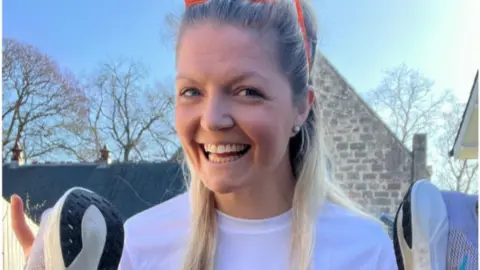**MPs Get Ready for the London Marathon: Expectations and Insights**
As the date for the much-anticipated London Marathon approaches, Conservative MP Harriet Cross finds herself in both excitement and trepidation about the event scheduled for Sunday. With aspirations of crossing the finish line in under four hours, she aims to achieve a personal milestone that would also allow her to break the existing record for the fastest female MP. Currently held by Jo Swinson, the Liberal Democrat leader from 2019, this record is a significant benchmark in the political athletic arena.
Cross is familiar with the record but remains grounded and cautious, acknowledging the challenge ahead. “There is a 26.2-mile course between me and that at the moment, so I don’t need to get ahead of myself,” she stated, emphasizing the enormity of the race. Her personal target is finishing below three hours and fifty-seven minutes, a feat she quietly aims to accomplish. “I’m hoping for something in the three hours mark, but we’ll see how it goes on the day,” she remarked.
Despite her impressive track record, including winning a 50km ultra-marathon in 2023, Cross expresses a rational concern leading up to the London Marathon. This will be her inaugural experience running on a flat road surface, as she primarily competes in mountain marathons, which offer reprieve on elevation with opportunities to walk uphill. The prospect of running before an audience of approximately 50,000 spectators adds to her nerves, making the event distinctly different from her usual Scottish race crowds, which usually comprise only a few hundred supporters.
On the other hand, Labour MP Cat Smith, who is preparing for her third London Marathon, also admits to experiencing “maranoia”—a term she coined to describe the anxiety that often accompanies marathon day. This phrase encapsulates her trepidation and self-doubt leading up to the race. Smith reflects on the mental struggle that can assail runners in the days leading up to a marathon, questioning their training effectiveness and overall readiness. However, she dismisses the notion of breaking speed records, having clocked in at six hours and six minutes in her last run.
Both MPs will join a total of sixteen Members of Parliament participating in the marathon, where the race serves more than a physical challenge; it also embodies parallel themes to a political career. As Cross puts it, one needs determination and focus, and distractions by the performance of others can have adverse effects. “If you go off at the start of the marathon with someone who is trying to get a two-thirty and you’re nowhere near, you’re not going to get very far,” she explained.
Their motivations extend beyond personal achievements; Cross is raising funds for Kayleigh’s Wee Stars, a charity dedicated to supporting families with terminally ill children. In contrast, Smith has chosen to run for the Bay Hospital charity, which focuses on providing supplementary resources and equipment that are not typically covered by the NHS.
In-depth discussions about their training, the mental hurdles they face, and the purposes behind their runs have found a platform through media channels. The BBC Radio 4’s program “Today in Parliament” will host interviews with the MPs, airings scheduled for 23:30 BST on the preceding Friday—providing a glimpse into the unique blend of athleticism and public service.
To conclude, the London Marathon goes beyond a mere sporting event; it serves as an exploration of personal capabilities and an avenue for MPs to support worthy causes. As Cross and Smith prepare to lace up their running shoes, they embody the dual spirit of competition and compassion, picked against the backdrop of one of the most famous marathons in the world. As they share their insights, both women stand as reflections of resilience, commitment, and the unyielding desire to push forward—both on the track and in their political endeavors.



